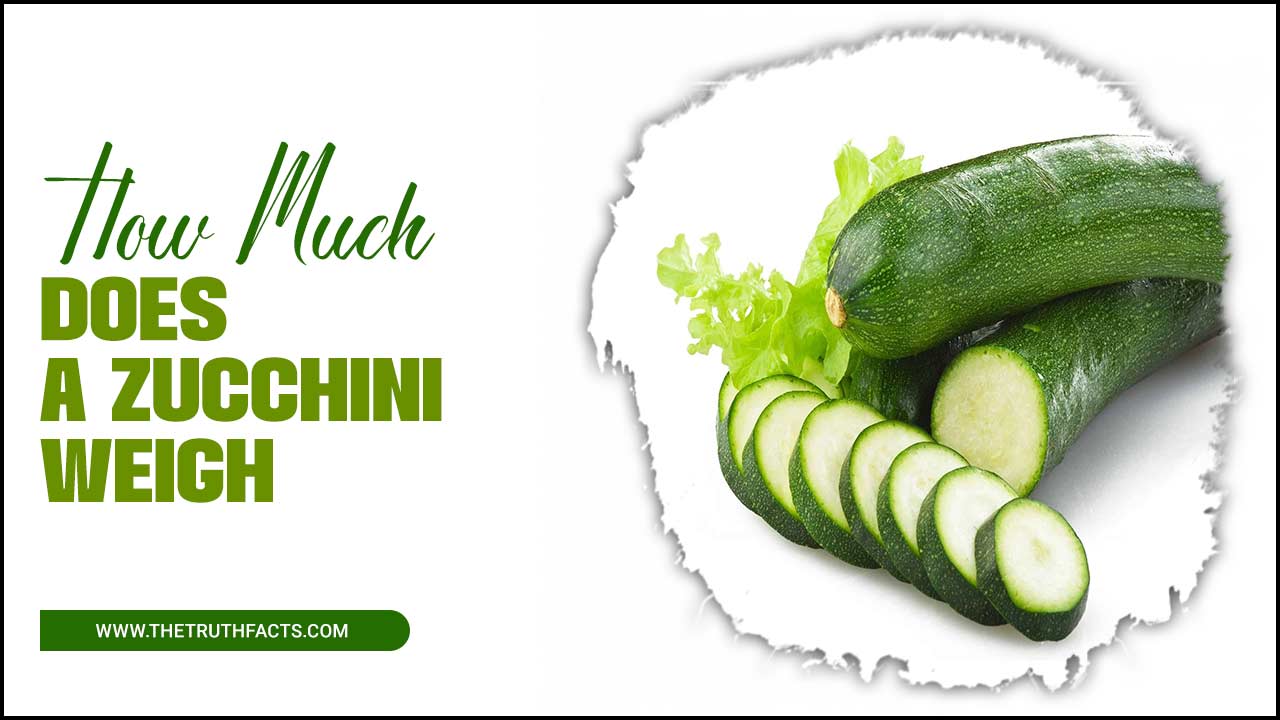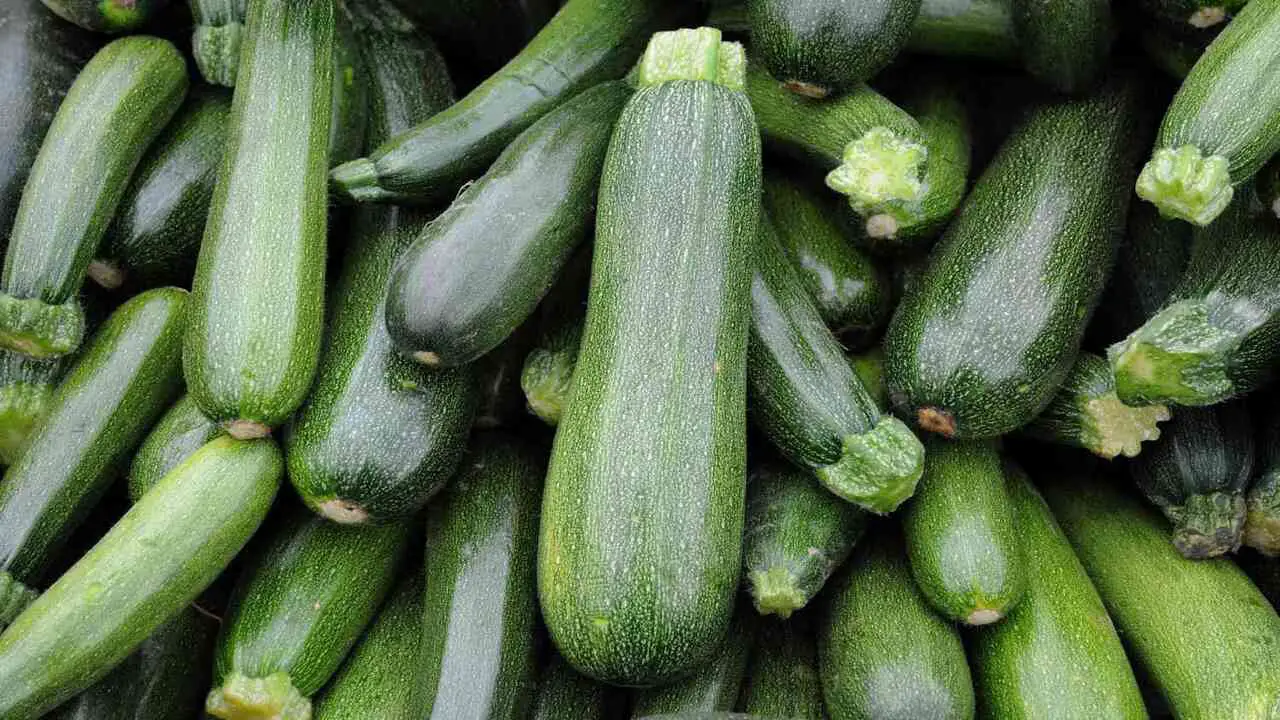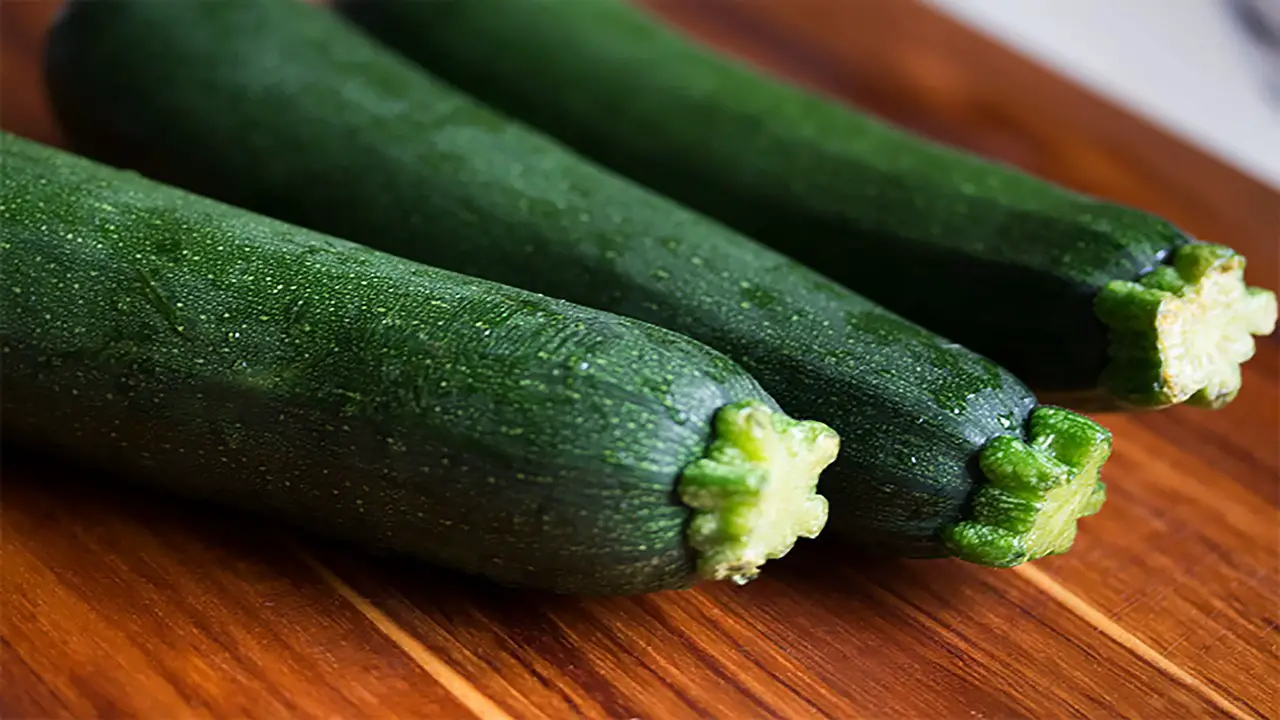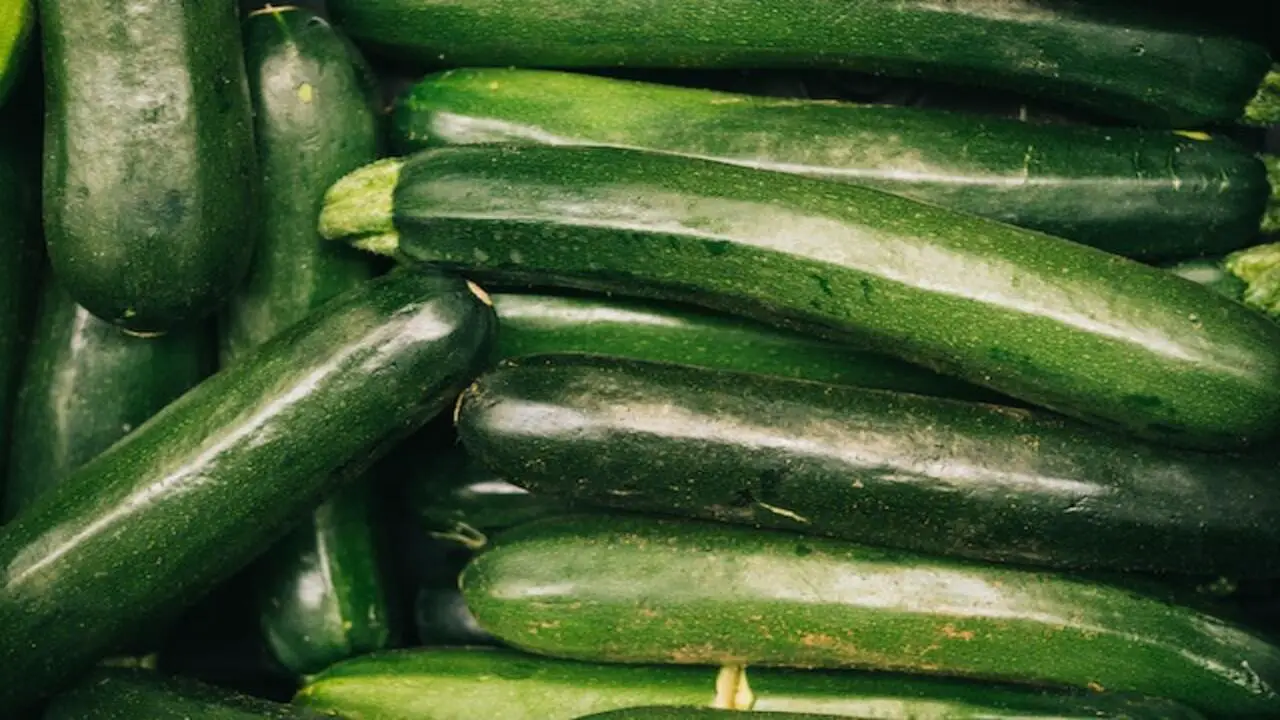The weight of zucchini can vary based on its size and the specific variety. Medium-sized zucchinis usually weigh between 6 to 8 ounces (170 to 227 grams), while smaller ones can range from 4 to 6 ounces (113 to 170 grams).
Conversely, larger zucchinis may weigh over a pound. It is best to use kitchen scales to obtain accurate measurements, as they provide precise readings for cooking and baking purposes.
Here we’ll explore everything you need to know about how much does a zucchini weigh. From understanding what zucchini weigh to examining the average weight of a zucchini and the factors that influence it. So, if you want to become a pro in cooking with zucchini and make accurate meal plans, keep reading.

How Much Does A Zucchini Weigh – Essential Information

The weight of zucchini can vary depending on its size and variety. Smaller zucchinis typically weigh around 6 ounces, while larger ones can weigh up to 10 ounces or more. Knowing the weight of zucchinis is important when planning recipes or determining portion sizes.
You can easily weigh zucchinis using a kitchen scale or by comparing them to common household items of known weight. This knowledge allows for more precise cooking and ensures you use the right amount of zucchini in your dishes. Additionally, understanding the weight of zucchini can help with portion control if you are following a specific diet or trying to manage your calorie intake.
Examining The Average Weight Of A Zucchini
Zucchinis are available in different sizes, and their weight can vary depending on their size and maturity. On average, a zucchini weighs approximately 6 to 10 ounces. However, larger zucchinis will generally weigh more than smaller ones.
It is important to note that the weight of zucchini can impact its taste and texture when cooked. Therefore, knowing the average weight can be beneficial for planning recipes and determining portion sizes. Whether you’re preparing zucchini bread or zoodles, understanding the weight of zucchini can help you achieve precise measurements and delectable outcomes.
Factors That Influence Zucchini Weight

The weight of zucchinis can be influenced by various factors, including their size, variety, ripeness, water content, and growing conditions. Larger zucchini will generally weigh more than smaller ones, and different zucchini varieties may have different weights.
A fully matured zucchini will also weigh more than an immature one. Furthermore, zucchinis with a higher water content tend to be heavier. Environmental factors such as soil quality and moisture levels during growth can also impact the weight of zucchinis. It is important to consider these factors when purchasing or growing zucchinis for recipes or other purposes.
The Impact Of Growing Conditions On Zucchini Weight
To promote optimal growth and weight of zucchinis, provide adequate sunlight, water, and soil nutrients. Temperature fluctuations and pest infestations can negatively impact zucchini weight, so closely monitor and address these factors.
Proper spacing, pruning, and selecting a suitable zucchini variety for your region are essential. Regular harvesting when the fruits reach their ideal size ensures continuous production. With ideal conditions and proper care, you can maximize the weight and quality of your zucchinis for a bountiful harvest.
The Effect Of Varieties On Zucchini Weight
Zucchini comes in various varieties; their size and weight can differ significantly. When choosing a zucchini variety to grow, it is crucial to consider the desired size and weight of the harvested fruits. Some zucchini varieties are specifically bred for their larger size and heavier weight, making them perfect for stuffing or grilling.
However, it’s worth noting that growing conditions such as soil fertility and watering practices can also affect the size and weight of zucchini. So, proper care and cultivation techniques are essential in achieving your zucchini harvest’s desired size and weight.
How Does The Weight Of Zucchini Influence Its Nutritional Value?

When assessing the nutritional value of zucchini, the focus should not be on its weight but rather on its overall composition. Despite variations in weight, zucchini remains a highly nutritious vegetable due to its abundance of essential vitamins, minerals, and fiber.
Notably, it is low in calories and carbs while being a rich source of vitamins A and C, potassium, and antioxidants. When selecting zucchinis for consumption, opt for firm ones that display vibrant colors and are free from any signs of blemishes or damage. These indicators ensure the best quality produce with optimal nutritional benefits.
Estimating Serving Sizes Based On Zucchini Weight
Estimating serving sizes based on the weight of zucchini is crucial for maintaining portion control and ensuring accurate recipe measurements. The weight of zucchini can vary depending on its size and freshness, so it is important to weigh it before incorporating it into your cooking.
By knowing the weight of the zucchini, you can effectively plan your meals and manage your intake of calories and essential nutrients. Whether you are preparing zucchini bread, zoodles, or any other recipe, estimating serving sizes based on the zucchini weight guarantees that you are consuming the appropriate nutrition for your dietary needs.
Zucchini Weight And Meal Planning: What To Know?
Incorporating zucchini into your meal planning can offer a variety of benefits. A medium-sized zucchini typically weighs around 6 to 7 ounces, making it a convenient ingredient. You can use this versatile vegetable in numerous dishes, such as stir-fries, salads, and grilled vegetables, to add flavor and texture to your meals.
Additionally, zucchini is a nutrient-rich option that offers essential vitamins, minerals, and dietary fiber. For those watching their calorie intake, zucchini provides a low-calorie alternative that still allows for a satisfying and delicious meal.
How To Measure Zucchini Weight At Home?

You can measure the weight of zucchini at home using a simple kitchen scale. Just place the zucchini on the scale, ensuring it is positioned in the centre and properly balanced. The weight will be displayed on the scale, which you can record. If you don’t have a kitchen scale, you can estimate the weight by comparing it to everyday household items with known weights. For example, if the zucchini feels as heavy as a can of soup or a small bag of flour, you can make an educated guess based on those comparisons.
Is There A Direct Correlation Between Zucchini Size And Weight?
The size of a zucchini is often associated with its weight, but this correlation is not always consistent. Factors like moisture content and the specific variety of vegetable can influence the weight of zucchini. While larger zucchinis tend to weigh more, variations within the same size range can still vary.
To ensure accurate measurements, it is recommended to use a scale when determining the weight of a zucchini. This will provide more precise information for recipes or other purposes where weight is important.
Conclusion
The weight of zucchini can vary based on various factors such as growing conditions and varieties. Understanding the average weight of zucchini is essential to estimate serving sizes and plan meals effectively. The weight of zucchini can also influence its nutritional value. Simple methods are available if you want to measure zucchini weight at home.
While size may not always directly correlate with weight, it can still give you an idea of the size of the zucchini you’re dealing with. So, whether you’re cooking or meal planning, considering the weight of zucchini is essential for accurate measurements and optimal results. Hope the above outline on how much does a zucchini weigh will be very helpful for you.
Frequently Asked Questions
1.What Is The Average Size Of A Zucchini?
Ans: The average size of a zucchini typically ranges from 6 to 8 inches in length. However, zucchinis can vary in size, ranging from small to large. Harvesting zucchinis when they are around 6 to 8 inches is recommended for the best taste and texture. Remember that zucchini size may also depend on the variety and growing conditions.
2.Are Large Zucchini Good To Eat?
Ans: Large zucchini can still be enjoyable to eat despite their size. However, they may have a tougher texture and larger seeds. If the skin is tough, it’s best to peel it before cooking or eating. Large zucchini are great for grilling, stuffing, or making zucchini bread. Taste and texture preferences may vary, so trying a small piece before using it in a recipe is always a good idea.
3.Is Zucchini A Fruit Or Vegetable?
Ans: Zucchini, botanically classified as a fruit, is commonly considered a vegetable in culinary terms. Known for its mild flavor and versatility, zucchini is often referred to as a “summer squash.” Whether enjoyed in salads, stir-fries, or baked goods, zucchini adds a nutritious touch to various recipes.
4.What Is The Difference Between Fresh And Canned Zucchini?
Ans: Fresh and canned zucchini differ in their state and texture. While fresh zucchini is harvested naturally, canned zucchini undergoes a preservation process, resulting in a softer texture. The flavor of fresh zucchini is more pronounced, while canned zucchini is suitable for recipes like soups or stews. Both options offer nutritional benefits.
5.What Are The Benefits Of Eating Raw Vegetables Over Cooked Ones?
Ans: Raw vegetables offer numerous advantages compared to cooked ones. They retain more nutrients, aid in digestion and nutrient absorption, and are lower in calories while higher in fiber. Incorporating raw veggies into your diet boosts your intake of vitamins, minerals, and antioxidants.
